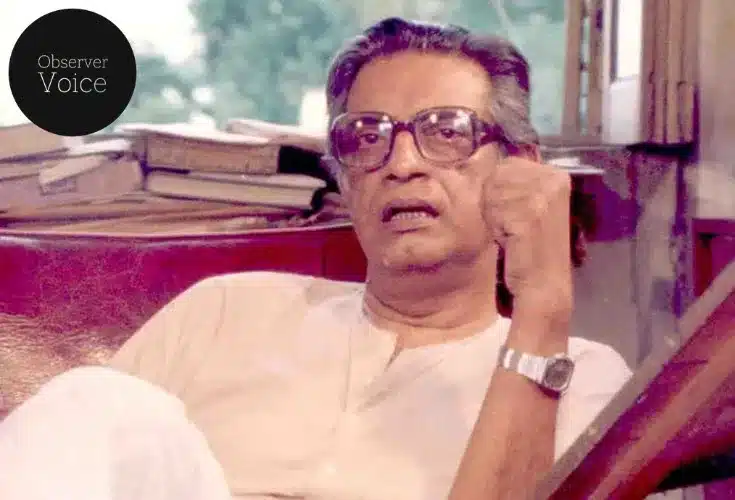Satyajit Ray, an Indian filmmaker

Satyajit Ray (2 May 1921 – 23 April 1992) was an Indian filmmaker, author, magazine editor, and music composer.
Early Life
He was born on 2 May 1921, in West Bengal, India. After attending Ballygunge Government High School, he enrolled at Presidency College, Calcutta, to pursue his BA in Economics.
Career
A British-run ad agency hired him as a junior visualiser. Also, he designed covers for various books at the Signet Press with D.K Gupta.
When he was at Signet Press, he worked on the children’s novel Pather Panchali, a work that made such a huge impact on him that it later became the subject of his first film.
In 1947, he founded the Calcutta Film Society with Chidananda Dasgupta. They screened foreign films, and most of them influenced his career as a writer and filmmaker.
Ray finally realized he wanted to be a film maker when he was working at Keymar’s office in London. During this time, he watched several movies that inspired him to become a professional filmmaker.
After he got back to India, he started working on his new passion for filmmaking. He set out to make a film based on his novel ‘Pather Panchali’ with an inexperienced crew and amateur actors. He finally got it out in 1955 after three years and a lot of hardship. Pather Panchali made a great debut on the big screen, and both critics and audiences liked it. It also did well overseas, getting positive reviews.
His next film, ‘Aparajito,’ solidified his status as a cult filmmaker. At the Venice Film Festival, it even won a Golden Lion award.
Following that, he did a comedy called “Parash Pathar” and “Jalsaghar”, a film about the decadence of Zamindars.
In addition to directing and writing scripts, he also worked as a cameraman and music composer. In his films, he experimented with new and interesting themes.
In 1961, he revived the children’s magazine Sandesh with Subhas Mukhopadhyay.
In 1964, he made his most famous and acclaimed movie, Charulata. It’s considered to be his magnum opus and was well-received by critics and audiences alike.
He worked in many different genres of filmmaking from 1965 to 1982, including fiction, fantasy, detective films, and historical dramas.
He made a musical fantasy called ‘Goopy Gyne Bagha Byne’ after failing to develop a US-India co-production of ‘The Alien’. His most commercially successful film to date. He followed it up with the sequel ‘Hirak Rajar Deshe’, which mocked Indira Gandhi‘s emergency period.
In 1984, he released his last film, “Ghare Baire,” before he got sick. Based on Rabindranath Tagore‘s novel about the dangers of fervent nationalism, the film got average reviews.
His career graph slowed down due to medical issues. He only made three movies in the last nine years of his life-‘Ganashatru’, ‘Shakha Proshakha’, and ‘Agantuk’.
Awards
He was honored with 32 National Film Awards and numerous international honors like the Golden Lion, the Silver Bear and the Golden Bear. He received the Golden Lion Honorary Award in 1982.
He won the Dadasaheb Phalke Award in 1985 and two years later, he got the Legion of Honor, the highest civilian honor in France.
In 1992, he was awarded the Bharat Ratna, the highest civilian award of India. He was awarded an honorary Lifetime Achievement Oscar by the Academy of Motion Picture Arts and Science.
Death
He died on 23 April 1992, in West Bengal, India.
Read More; Chetan Bhagat, an Indian author
Observer Voice is the one stop site for National, International news, Sports, Editor’s Choice, Art/culture contents, Quotes and much more. We also cover historical contents. Historical contents includes World History, Indian History, and what happened today. The website also covers Entertainment across the India and World.

